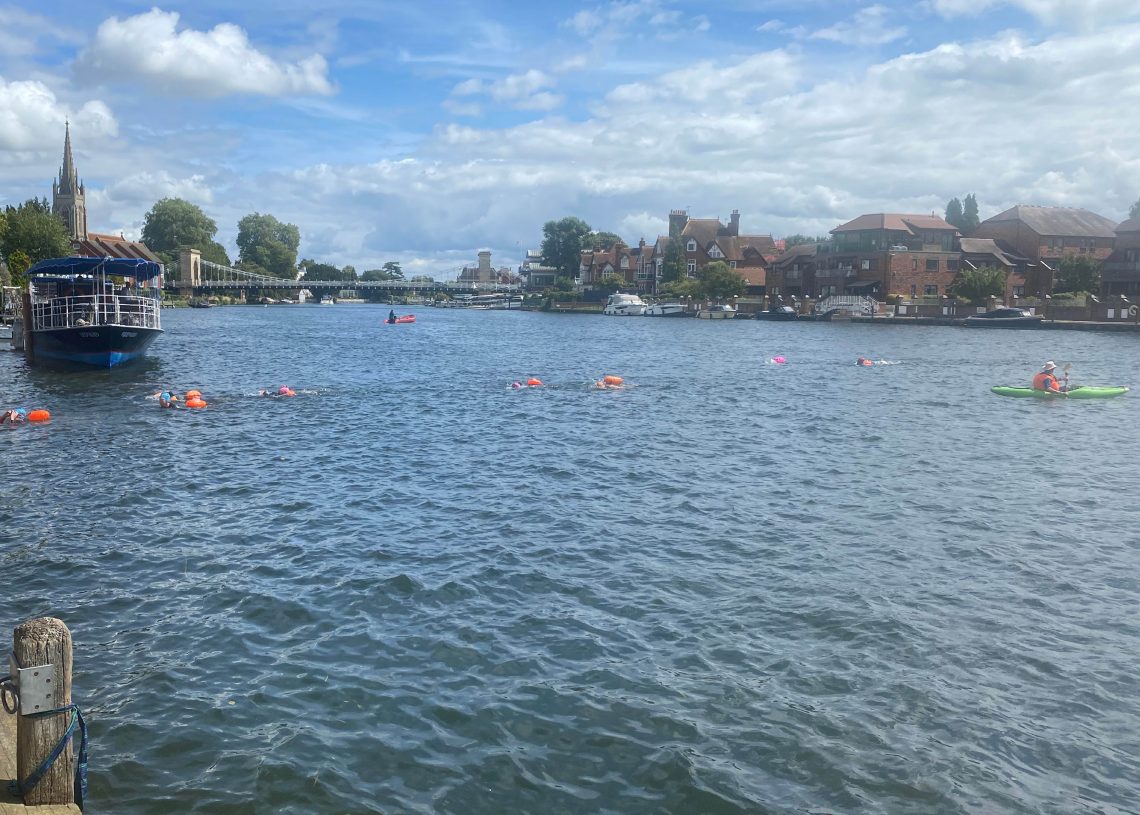
Messing about on the river: an event review of the Thames Marathon
Ben Lane reports on his 13km swim in the infamous Thames Marathon, where “a good mindset, a certain level of fitness and a solid pre-training programme” were a must.
The Thames Marathon is well-established in the calendar – it is one of those must-do swims. There are good reasons for this; it’s a long way and it’s in a beautiful part of the world. The swim connects Henley-on-Thames and Marlow and meanders scenically through beautiful countryside. If the conditions are in your favour, and the gods of the water are on your side, you will be assisted all the way on an imperceptibly gentle flow carrying you to the end point in Marlow – almost effortlessly. Almost. This turns what could be a daunting prospect into a manageable challenge. But it is still a mighty challenge. An average swimmer will have around 4 or 5 hours alone for a swim of this length – with no-one to chat to – so the mind needs to be in a good place!
Before entering this event (supported by Outdoor Swimmer) I had achieved a 5km loop around Dorney Lake, the Eton College Rowing Centre, so this was a certainly a step up and required a bit more attention. Along with a good mindset, a certain level of fitness and a solid pre-training programme is a definite must. But ultimately, it’s mind that will get you over the line on such a long swim.
The thinking starts early on. You need to consider all sorts of variables, the weather for one. Is the car in good working order? Do I have my phone? Registration details? Spare goggles? Another spare in case the spare gets lost. And so, it goes on. Can I really swim? Questions that will niggle you all day. So, you need to find a safe place.
You arrive at the venue a bit lost and begin looking for a friendly face to give guidance and reassurance. You find the registration desk and there is bustle of people and happy faces; they all seem to know the procedure. They all seem to be doing things. You join a queue and wait. Someone then thrusts a bag and declares this is yours and there are more things to do – secure and store bags, strap on timing chips, read information, slip into a wetsuit, affix a tow float. Your mind is racing, and you still haven’t been anywhere near the water.
The Henley Swim crew were calm and unflustered, and patiently answered every question – and as there only a finite number of questions, you can imagine they repeated themselves often that day. But they did this always with good grace and humour.

Time to take stock
There is plenty to listen to during the pre-swim. You will have time to nose into conversations, ask questions, claim ignorance. Begin to pick up on the vibe and the expectations from those around you. This will settle you into a pattern; you can then collate this information and form ideas of your own.
We arrive at the start point in Henley-on-Thames – our transport that day was a double-decker London bus, the old-fashioned sort. The pleasing chatter on the bus provided a few more tips and ideas. Soon enough we were entering the water and taking our first stokes into the great unknown – it really is a big river. And 13km seems, at that point, almost ridiculous. Almost.
During the start of any event, it is a bit messy. People jumping in, pushing and shoving, the water getting gets churned up, you’re under pressure to get going and join a group. You may feel the onset of panic. As humans we feel safe in a pack, even though the pack might not be right for us. Forget all that. Do it your way. Begin as carefully as you need, stay away from the pack, and find your rhythm and space. Find time to control nerves. From here you can develop your ideas and experiment with technique.
I used to get very focussed on my pace, and annoyed that people kept swimming passed. Forget all that. Use your own pace and ignore those around you. I got into the practice of trying to match the pace of walkers when swimming in certain venues. It’s a great game and creates a mini challenge to try a different rhythm, but importantly it offers the mind a diversion from the relentless motion of swimming. During the Thames Marathon I spied a couple of early morning walkers along the river path and played this game; it kept my spirits up for the next kilometre or so.
You learn to love the beat of your breathing
During a swim, like any activity, breathing is the beat we use to keep us moving onwards. You will learn to love the beat of your breathing. But it needs controlling, and it needs to be efficient. The mind will let you know if you are taking in enough air or taking in too much air. Focus on the feeling of breathing in beautiful fresh air and expelling it under the water. This motion, albeit very simple, gives the mind something to work on, something to think about. Another few kilometres complete.
Directions are one of the greatest distractions of any journey. We are always trying to find the best route, avoiding traffic or road works. Swimming long-distance is no different. During the Thames Marathon I was constantly lifting my head to see where my fellow swimmers were or the friendly team in their canoes, guiding the way. I was even comfortable when my goggles fogged up, and although it put me off my stride, it gave me something to think about and fix. These distractions are welcome and should be embraced, they will occupy your thoughts, and divert attention away from the task at hand – another kilometre goes by.
Eventually you spy the finishing area and expel a thankful last breath of air into the water and clamber out of the river up a metal ladder. Helping hands haul you on to the river path and give you a pat on the back – well done, well done. It’s a good feeling and the day has not been wasted.
The Thames Marathon is a long way but if you follow a few simple rules and prepare well and control the mind – it is perfectly manageable and a real pleasure to swim. Messing about on rivers is my new favourite thing – for now.
Find out more about the Thames Marathon on the Henley Swim website. Registration for the 2024 event opens in September, so keep an eye on the website.









